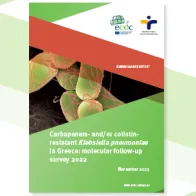Rapid spread of highly drug-resistant Klebsiella pneumoniae in Greek hospitals
The study confirmed the continued circulation of K. pneumoniae ST39 in the participating hospitals. Furthermore, similar spread may have already occurred with K. pneumoniae ST323, another carbapenemase-producing, highly drug-resistant clone, which was not found in previous genomic surveys in Greece but was detected in six hospitals in 2022.
By estimating the transmission events, the study also identified healthcare-associated transmission as a likely cause of the spread of carbapenemase-producing K. pneumoniae in the participating hospitals.
These findings provide an example for the rapid dissemination of newly emerging threats through a hospital network.
Rapid intra-hospital and inter-regional spread of carbapenemase-producing K. pneumoniae and other emerging antimicrobial resistance threats has also been documented in other European Union/ European Economic Area (EU/EEA) countries.
To prevent the repeated occurrence of patient-to-patient transmission of high-risk K. pneumoniae clones, including ST39 and ST323, as well as the transmission of other pathogens, enhanced infection prevention and control measures with sufficient resources for their implementation should be made available in hospitals and other healthcare settings.
Strengthening of national molecular surveillance in Europe, making use of whole-genome sequencing, is also essential to track emerging antimicrobial resistance threats, as well as to assess the effectiveness of interventions to control their spread.
Read the report

The main aim of the genomic study described in this surveillance report was to determine the distribution of the highly drug-resistant clade of Klebsiella pneumoniae (sequence type (ST) 39 in Greek hospitals in 2022.
Carbapenem- and/or colistin-resistant Klebsiella pneumoniae in Greece: molecular follow-up survey 2022
English (6.33 MB - PDF)Related Eurosurveillance article
Share this page




